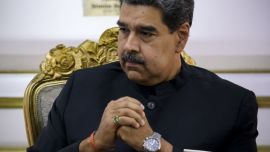Despite spokesman Manuel Adorni's best efforts to convince us that the relationship between President Javier Milei and Vice-President Victoria Villarruel is “fantastic,” the protagonists and even their entourage are multiplying the signs to the contrary.
The question is no longer why it is happening, but how it can end.
The succession of conflicts began at the end of the electoral campaign, with the President’s sister, Karina Milei, playing a key role in distancing Villarruel from any influence on the incoming administration. The distance has only widened as the months went by, with mutual betrayals and unfulfilled promises. To recall each of them would take hours.
Since last weekend, the disputes have once again been publicly exposed. Like an iceberg, what is visible is minimal compared to what is submerged. Villarruel claims that she was not invited to an Armed Forces dinner, where Milei was present. Nor was she invited to a ceremony attended by the President in homage to José de San Martín. She was going to travel to Mendoza but cancelled at the last minute.
On Monday, a new increase in wages and allowances for the Senate, which was chaired by Villarruel, was announced. Milei exploded – ‘“a betrayal of the Argentine people,” was the mildest of his declarations.
But it came with an extra demand: he wanted to know who was responsible for this new increase that would (obscenely) allow each occupant of the 72 seats in the upper chamber to receive nine million pesos a month. All eyes were on the vice-president.
A clarification is in order: Villarruel’s defence – that the coupling of senatorial allowances with legislative staff's pay scale was “imposed” by all the Senate caucuses in a pathetic session of last April, when they tripled their own income – is true. And when we refer to all the caucuses, we mean all the caucuses, including La Libertad Avanza. What the vice-president avoids admitting is that she was aware of this agreement before it was proclaimed.
The presidential fury had some effect. On Thursday, in a special session, the Senate will uncouple their allowances from the legislative paritaria and they will continue to receive the same wage as before the recent increase: 7.5 million pesos pocket money, plus tickets and contracts for consultants. Not bad.
Exchanges of friendly fire have extended to another sensitive area, the Executive branch's bid to put controversial federal judge Ariel Lijo on the Supreme Court. Just as debate on approval begins in the upper chamber, libertarian senator Francisco Paoltroni is shouting his opposition, arguing that the appointment is a betrayal of the LLA's innovative ideas and lashing out at Santiago Caputo, Milei's premium advisor.
Those who criticise Caputo “are people who don't understand anything,” responded the President.
Paoltroni is far from being a misguided libertarian soul. He also slammed Presidential Spokesperson Manuel Adorni and Agustín Romo, the head of the LLA caucus in the Buenos Aires City Legislature who is demanding the senator obey presidential directives.
Villarruel has decided to support Paoltroni. On Tuesday, at the Bar Association of the City of Buenos Aires, the vice-president spoke out against Lijo's candidacy for the nation’s highest tribunal, hours before the magistrate was due to defend his candidacy before the Senate Constitutional Affairs Committee. On this issue, and not only this issue, Villarruel agrees with Mauricio Macri.
It pays little or nothing to bet on who the government will blame if Lijo's nomination is rejected by the Senate. The worrying question is what it could lead to next.
























Comments